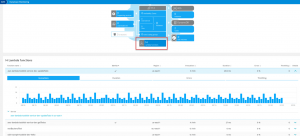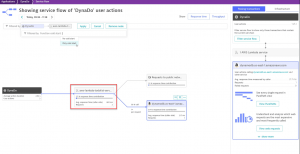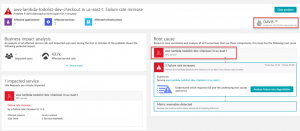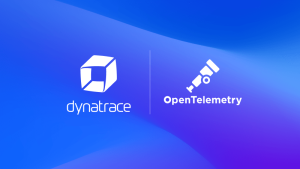We’re excited to announce that Dynatrace has been recognized as a launch partner for the newly introduced Amazon Web Services (AWS) offering AWS Lambda Function URLs.
What is AWS Lambda?
AWS Lambda is one of the most popular serverless compute services in the market. Serverless functions help developers innovate faster, scale easier and reduce operational overhead, removing the burden of managing underlying infrastructure when updating and deploying code. Most enterprises use serverless functions as part of a broader hybrid environment, covering both cloud and traditional technologies.
What are AWS Lambda Function URLs
AWS Lambda Function URLs provide a new more streamlined access for developers to their functions. Previously, developers would provision APIs and API gateways in order to configure all the desired lambda function settings making for longer setup times and decreased efficiency. With today’s announcement of this new feature, AWS is making it easier to invoke functions over HTTPS as a built-in capability of the AWS Lambda service. This feature introduces a new Lambda resource type with 5 new APIs for creating and managing Function URLs. Customers can monitor their Function URLs with new CloudWatch metrics such as UrlRequestCount, Url4xxError, Url5xxError, and UrlLatency.
With this new feature, AWS is again recognizing and addressing what developers have been asking for and in the case of AWS Lambda Functions, it was a more efficient way to address configurations. Using the AWS console one can simply generate a distinct URL endpoint that is then used to invoke a function. This newly generated URL can then be executed in tools such as Postman and others as well as executed within cloud automation scripting tools such as Cloud Formation and Terraform for example.
Lambda Function URLs benefits
- Increased efficiency for Lambda function configurations
- AWS Console quickly provisions URL endpoints
- Set CORS and headers of the response
- Adds robust response and request data no longer only event payloads
AWS Lambda function URLs and end-to-end observability
As you build applications and rely more and more on Lambda architectures you need full observability of all tiers of the supporting infrastructure. This is necessary to understand how your Lambda functions are performing and impacting your environment.
- Seamless end-to-end distributed tracing
- Automatic root cause analysis for DevOps, cloud, and apps teams
- Insights into how serverless functions impact user experience
- Cold start analysis

Seemless Cloudwatch Integration

AWS Lambda functions optimization
AWS manages the infrastructure of your Lambda functions however you still need to ensure that your implementations are designed to get the most out of your investment.
- Optimize response time hotspots
- Optimize timing hotspots
- Simplify error analytics
- Identified in context errors via our intelligent platform
- Opportunities to optimize your architecture

Davis AI anomaly detection with Lambda functions
Begin monitoring AWS Lambda Function URLs today
You’ll find all the information you need to get started on the AWS Lambda deployment page in your Dynatrace environment.
- Select Deploy Dynatrace from the Dynatrace navigation menu.
- Enter AWS Lambda into the search bar at the top of the page.
- Select the AWS Lambda tile and then select Activate AWS Lambda at the bottom of the page.
You have options for configuring the extension. You can either set it up using environment variables, use a config file, or you can include pre-defined code snippets in your serverless framework, Terraform, CloudFormation, or AWS SAM setup.
Resources
See the documentation topic Deploy OneAgent as Lambda Extension for more details on getting started. Or sign up for a free 15-day trial.
For more information, see Dynatrace extends distributed tracing for serverless on AWS Lambda.
For more information on AWS Lambda and Dynatrace, see AWS Lambda monitoring. To learn more about how Dynatrace and AWS are “better together”, see AWS Monitoring.





Looking for answers?
Start a new discussion or ask for help in our Q&A forum.
Go to forum